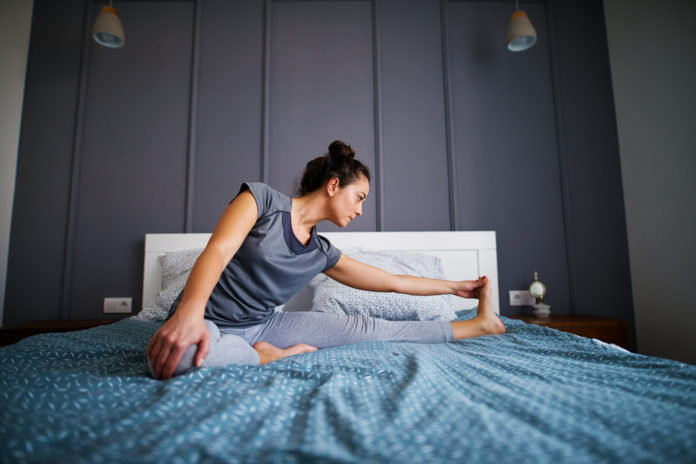How Exercise Helps You Sleep Better
Exercise helps you sleep better in multiple fashions, including by:
Inducing Sleep Cycles
Think about it: Exercise burns a lot of energy. But the energy loss does not just leave us feeling tired, but generates heat and triggers an increase in body temperature.
When the body eventually normalizes and comes back down to temperature baseline hours following, that post-exercise drop in temperature is suggested to induce sleep cycles.
That being said, there is a lot of question whether or not you should be working out before bed, as the high body temperature and elevated endorphins hypothetically leaves you feeling energized and delays your transition to sleep.
But when put into question, exercising before bed affects individuals unequally, while some have no trouble falling asleep and others are left with the night owls.
So ultimately, the best time to exercise is what works best for you! And the importance is not so much on timing, but rather that exercise is accomplished!
Increasing Sleep Duration
Getting to sleep is only half the battle, as adult men and women should sleep for seven to nine hours on a nightly basis.
Luckily, Advances in Preventative Medicine reports 29 studies have concluded exercise increases sleep duration. And as an added bonus, satisfying both physical activity and sleep duration requirements may play an important role in working memory!
Improving Sleep Quality
But along with sleeping the recommended seven to nine hours of sleep each night, regular exercise has shown to improve sleep quality and deep sleep.
A study published Mental Health and Physical Activity found that 150 minutes of moderate to vigorous physical activity a week provided a 65 percent improvement in sleep quality. Among more than 3,000 men and women aged 18 to 85, regular exercisers were 65 percent less likely to feel overly sleepy during the day.
Furthermore, vigorous exercisers are almost twice as likely as non-exercisers to report the best sleep. However, any movement is better than no movement, as those who sit for fewer than 8 hours a day were significantly more likely to report “very good” sleep quality.
Decreasing Anxiety and Depressive Symptoms
Feeling stressed and anxious can significantly disrupt your ability to fall asleep. Fortunately, exercise is a well-known stress-reliever, along with reducing arousal, thus facilitating a stress-free (or reduced), better night’s sleep.
Staving Against Sleep Disorders
Exercise is regular recommended for those who suffer from insomnia, or the inability or difficulty of falling asleep or staying asleep, which causes fatigue, difficulty concentrating, mood disturbances, and decreased performance at work or school and increases the risk of mental and physical health concerns, including heart disease, diabetes, and depression.
Non-exercises are at the highest risk of sleep apnea, while regular exercise can also stave against restless leg syndrome.
Sustaining A Healthful Cycle
The benefits are bidirectional, as getting a good night’s rest amplifies energy to conquer your workouts!
And not to mention, a good night’s rest fights against cravings against high-carb and fat foods. (Now that’s a mega win-win!)
How to Reap the Benefits of Exercise
While the benefits of exercise for sleep are compelling, there is a point worth mentioning:
The greatest gain might be gifted to those who exercise on a regular basis.
In fact, research published in the Journal of Clinical Sleep Medicine proposes it may take up to 16 weeks to connect exercise with a better night’s sleep. But once the link enveloped, participants slept an average of 45 minutes longer!
However, the evidence is simply not to meant to be discouraging, but rather highlight the importance of regular exercise. (Because really, quick fixes are often too good to be true anyways.)
That being said, if you are not a regular exerciser, there is no better time to start than now! Here are some tips to get you started:
Consult with the Professionals
Before starting any sort of exercise regimen, and especially if new to exercise, it is recommended to always consult with your primary care provider for upmost safety. A personal trainer can also help show you the ropes and get you comfortably and safely started.
Start Slow
Nope, you do not have to jump the gun and sign up for a half-marathon… Simply start slow and work your up to the recommended 150 minutes of aerobic exercises each week, including biking, swimming, dancing, and brisk walking. Ultimately, try out what you
Strength Train
Along with aerobic exercise, strength train at least twice a week to grow and preserve muscle mass.
Go Fast
Crunched for time? Remember, since any movement is better than no movement, go fast and tackle this 10-minute (no excuse) workout!
Stretch
Whereas stretching is commonly dismissed or forgotten about following a workout, it can improve flexibility and encourage greater range of motions. Nonetheless, stretching protects against muscle tightness and keeps you agile to workout on a regular basis.
Work Out with A Buddy
Make it more enjoyable with a workout buddy! Doing so can also motivate (and maybe even obligate) you to workout!
Stay Consistent
Ultimately… Stay consistent and make physical activity a daily habit. Because not only can exercise and being active improve sleep, but benefits physical and mental health at all levels!









